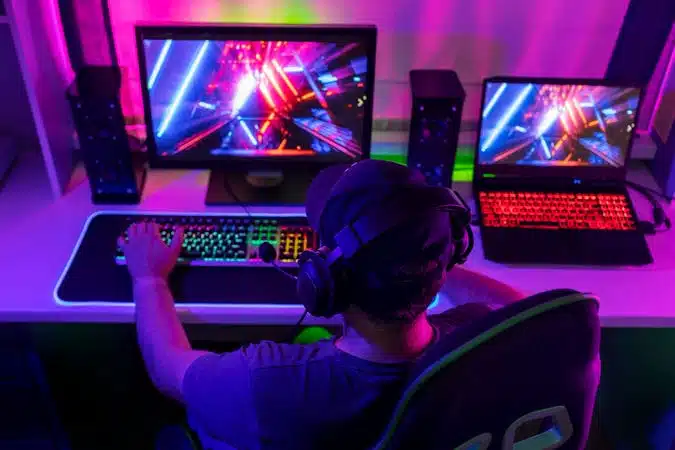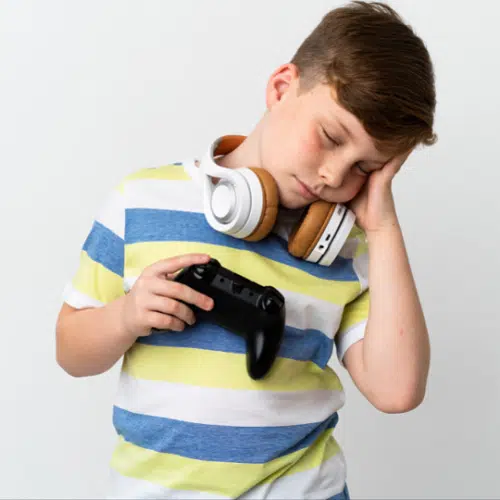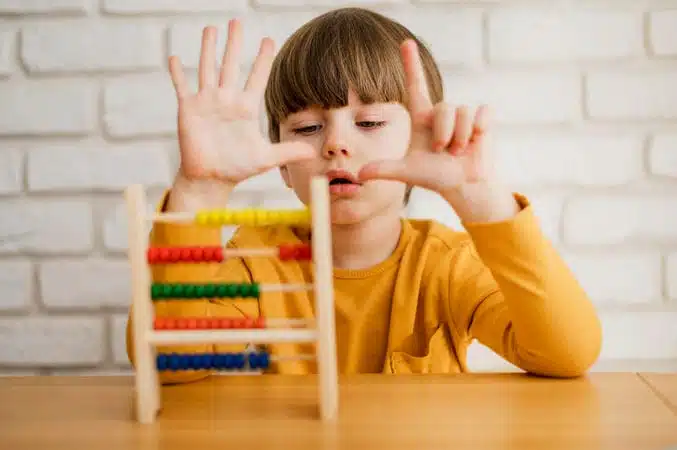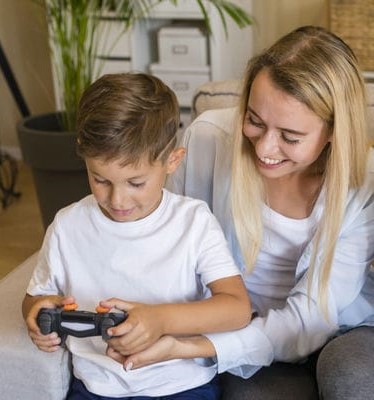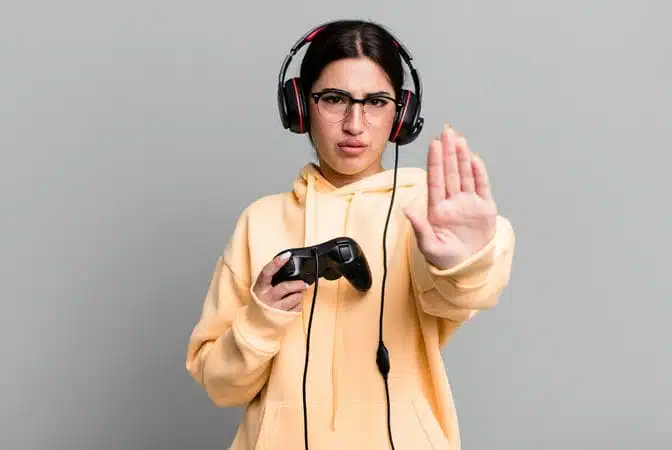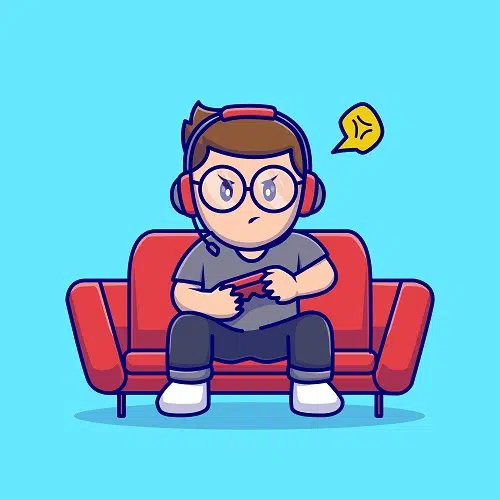Contrary to popular belief, playing video games is not all that bad for one’s health. Research has shown that playing video games for at least an hour a day can have numerous benefits for children. It can help improve many important skills, like critical thinking, multitasking, situational awareness, and fine motor skills.
If your child wants to play video games with friends, consider not discouraging them. In fact, you will definitely encourage their hobby once you learn all about the mental exercise they will be doing while having fun. While video games have their positives, everything needs to be done in moderation because too much game time can also lead to negative side effects like video game addiction and poor sleep.
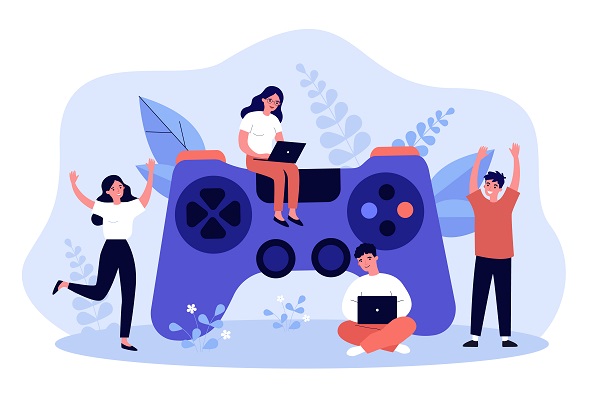
The Gamer Stereotype is Not Always True
We all know a common perception is that people who play video games are lazy and antisocial. Interestingly, research (which we will further discuss below) shown quite the opposite, video games may even help socialize your children. Children who play video games usually do so with their friends online, which teaches them better communication skills and teamwork.
Example, multiplayer games like Counterstrike: Global Offensive requires that the players describe the enemies’ positions and collaborate to defeat them. In the long run, this results in children to have greater attention to detail and better at communicating with others.
Additionally, video games can be quite a productive hobby because they encourage learning and often teach more than traditional methods. As useful educational tools, they can teach children more engagingly than in the classroom for subjects such as:
- Science
- Math
- History
- Coding
Since most children in America play video games, it would be much more beneficial to let go of negative stereotypes and to create a safe and moderated environment for children to explore their problem-solving skills and creativity in a fun online environment.

Direct Links Between Gaming and Violence Disputed
The debate of violence caused by video games has been going on for the past 40 years. With various psychological studies finding different results. However, more recent studies have not found a direct correlation between video games and violence – examining this link is especially difficult because of other environmental variables.
Daphne Bavelier, a neuroscientist at the University of Rochester New York, believes that we need to take a more holistic approach while discussing video games:
“We know there are good sugars and bad sugars, and we don’t discuss whether food, in general, is good or bad for us. We need to be far more nuanced when we talk about the effects of video games.” Source: BBC Future
Some studies have shown that not only is there not a direct correlation between violence and video games, but, funnily enough, the opposite can be true. Video games can aid children in controlling their emotions, or more specifically, anger issues. When one is angry, one’s accuracy while shooting usually decreases a lot, which results in a major loss of points. Thus teaches the child to act more steadily in adverse situations and take control over their anger.
However, it is still important to consider that not all people react in the same manner while playing video games. It can have a negative effect in some cases, especially when children are left to their own devices. If you would like to learn more about the different perspectives regarding violence and video games, this article from the American Psychological Association and the article from the BBC previously mentioned are great starting points while doing your own research.
Video Games are a Source of Brain Exercise
A study from the Max Planck Institute in Germany conducted an interesting experiment that supported the hypothesis that playing video games has numerous benefits for the brain. The scientists formulated two groups – a control group of people who did not play video games and a test group of people who played Super Mario 64 for half an hour a day for two months.
At the end of the study, it was evident that the brain structure of the people in the group who played video games had drastically changed. They had a significant increase in grey matter, or brain size, essentially.
The areas of the brain that were affected the most were:
- The cerebellum – The cerebellum is the brain’s control center for fine motor skills, which is exercised during gameplay when you have to react quickly to the things happening around you.
- The prefrontal cortex – The prefrontal cortex is the area of the brain that is responsible for planning and decision making
- The right hippocampus – The right hippocampus has a lot to do with memory
All of those skills are put to the test while playing video games.
All of these findings bring the following quote by Idowu Koyenikan to mind:
“The mind is just like a muscle—the more you exercise it, the stronger it gets, and the more it can expand.” Source: Goodreads
And as it turns out, video games are one of the best forms of “brain exercise” you can get.

Playing 30 Minutes a Day Can Improve Life Quality
As demonstrated in the experiment above, people who played video games were shown to have improved skills in various areas. Skills like problem-solving, logic, spatial skills, multitasking, quick thinking and decision-making, and accuracy improve children’s life quality and may even help them perform better in school.
A huge positive of gaming that parents often underappreciate is the feeling of happiness children experience while playing video games. Gaming with friends has been shown to improve mood and decrease feelings of anxiety. Which are complex psychological needs that everyone requires. Having a hobby that brings children joy from an early age is vital for their proper development.
Additionally, children with dyslexia or mental disabilities have shown more progress while using video games as a therapeutic tool to learn skills that they might lack compared to their peers, like having a fast reading speed at a certain age.
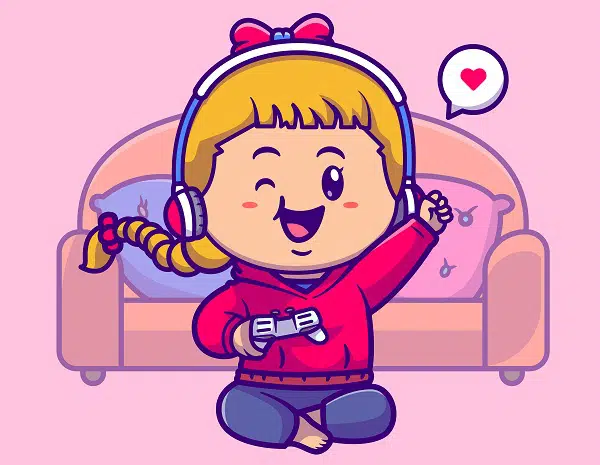
Some Games Even Provide Physical Exercise
Not all video games include shooting the enemy or creating fantastic worlds with imaginative creatures. When people hear the words “video games,” they often forget about this genre of video games, also known as exergames, that double as a fun exercise routine.
Exergames are often great to have because they can be an easy and convenient way to get in a workout. You don’t need any special gym equipment, and you don’t even need to leave your house! You are probably already familiar with the benefits of exercising like weight management, improved life-quality, and less joint pain, so we won’t go into detail here.
Important thing is investing in one of these games will surely improve your and your child’s overall quality of life.
Here are a couple of exergames for you to consider:
Dance Dance Revolution
DDR is a music video game that originated in Japan, where the players have to follow arrows with their feet on a dance platform and are judged based on their timing and accuracy.
Just Dance
Just Dance is similar to DDR in that there is music and dancing involved. However, it does not require a dance platform, more often played on a Wii or Kinect using motion controllers.
Wii Sports
Wii Sports is a sports simulation game that includes tennis, boxing, baseball, bowling, and golf. Where the players move the remote like they would if they were actually playing the sport in real life.
Beat Saber
Beat Saber has been called Dance Dance Revolution with lightsabers. It is a virtual reality game where the player has to feel the music’s rhythm as they use sabers to hit a series of approaching blocks. This VR technology is relatively new and not as widespread yet.
Whatever your choice of exergame, these types of games tend to save your child’s progress, so it acts as a motivational tool. With that in mind, your children are even more likely to engage in some fun video game exercise while feeling a sense of accomplishment that they wouldn’t normally get from simple exercise.

Historical Games Create Interest in Actual Events
Aside from computing and coding skills, there are also video games for children who are interested in history. Historical video games are a great method to learn about real-life events and people. Their interactive nature makes them extremely interesting to children, even if they are not interested in school history classes.
These games can be simulations where the players recreate historical events or are loosely based on real people. They are usually incredibly educational and can also strengthen children’s reading and listening skills.
Here are some fun historical games that you can take a look at which will most definitely spark your child’s interest:
Assassin’s Creed Odyssey
This game is set in the period of 431-422 BC, and it explores the events during the Peloponnesian War. Where the players can fight with the groups led by either Athens or Sparta. The game also includes many figures from history and Greek mythology like Democritus and Medusa. Additionally, Assassin’s Creed has many other games set at different time periods.
Alexander
Alexander is a strategy game that is loosely based on the life of Alexander the Great. While it may not be as historically accurate, it can still urge children to learn more about the Persian Empire.
Red Dead Redemption 2
This action-adventure video game takes place in the American Wild West in 1899. It recreates the life of Arthur Morgan and Van der Linde gang in a fictional world inspired by real-life events.
Empire Games Teach Planning & Resource Management
City-building games are another genre of video game that fosters creativity in children. Their appeal comes from the fact that you can create your own little universe that you control and essentially participate in the gameplay as an omnipotent creator.
The psychology behind city-building and empire games is fascinating. We usually aim to control as much as possible in our daily lives, but our inability to do so can often lead to feelings of apprehension. However, city-building games are the one type of game where the player has full control over what happens. Sure, there may be obstacles to overcome, like natural disasters and attempting to manage finite resources. However, this ultimately teaches children how to be better at planning and being considerate of an environment.
City-building games are probably some of the best-known video games that can be played by anyone. Regardless of their age or previous experience with video games:
- Minecraft – Minecraft is a great game because it is relatively easy for beginners and has three playing modes (Adventure, Creative, and Survival). Like the name states, creative gives full creative control where the players can build worlds without having to worry about defeating enemies. At the same time, the other two modes can teach players to use objects to solve complex problems and strategies.
- SimCity – Like Minecraft, SimCity enables the players to build entire cities and manage them. Which teaches skills like urban planning and development and resource management.
Overall, city-building games tend to be the least graphic with only minor violence. Hence, if you don’t want your child to play more violent games at a younger age, city-planning games will surely do the trick.
Video Games Teach Key Tech Skills in a Tech World
It is no secret that technology is taking over our world as we know it every single day. So having and being able to implement technological skills is part of our present and future as a society. People who play video games are exposed to a lot more technology than the rest, which always ends up being extremely helpful.
Because of video games, children may start having a keen interest in technology, which will open many doors for them. Having technological skills like programming may lead children to pursue this hobby further and enter careers such as IT and video game development.
Moreover, some of the skills that video games teach, like pattern recognition and problem-solving, help even more while entering technology careers.
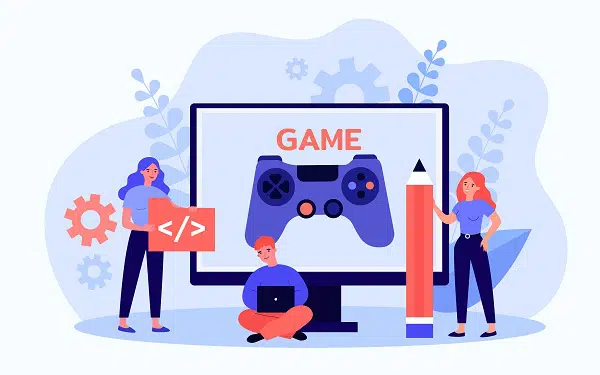
Video Games Teach Resilience
The beauty of video games is that once your character fails or dies, you always get a second chance. This can be extremely beneficial because children are taught that failing the first time does not mean that they cannot do something if they put their mind to it.
Resilience is an important life skill that will help them with their education and with their future career, no matter what field it is. Experts have found that the most important aspect of having a healthy relationship with video games is the intention behind playing. Children who play while devoting their full attention, concentrating, and setting winning as their main goal and priority tend to reap more video games’ benefits.
Setting this intention has the effect of extreme motivation to finish the game they started. Not only do video games teach children resilience, but they also improve concentration, decrease hyperactivity, and increase overall motivation.
How to Create a Beneficial Video Game Environment for Your Children
While video games can be very beneficial, they can also have negative side effects. Including less time spent socializing with family and friends in real life, less reading, and decreased sleep quality.
In order to reap the benefits of video games while avoiding the pitfalls. There are a couple of things that you, as a parent, can do to moderate your child’s video game time.
Put a time limit on the video games they play
The studies we looked at stated that gaming for at least 30minutes to an hour a day can be beneficial. However, if your child is keener to play video games, setting a limit of one and a half hour per day is also reasonable.
Make sure the video games are appropriate and restrict in-app purchases
Some video games can be inappropriate for certain age groups. Hence, it is always wise to check the Electronic Software Ratings Board (ESRB) to make sure that your children are not exposed to explicit content. Additionally, many video games have in-app purchases. Often, children cannot differentiate between spending real-life money once they are immersed in a game. Thus, restricting those is the best idea.
Communicate with them about their game time
Take an interest in their hobby and ask them questions about what they did in the game and what they learned. This way, they will feel like you are more involved in their life.
Use parental controls like the one offered by Limit Launcher
Limit Launcher lets you moderate your and your child’s gaming time and ensures that you don’t go over the limit. This parental control tool is a staple for managing computer games; it lets you set time limits, after which the games shut down automatically. Unlike other parental control tools, Limit Launcher values your children’s privacy and does not collect their data. Moreover, setting it up is extremely easy. The computer can still be used for school work, so that internet access and screen time are not limited.
All in all, video games do not necessarily incite violence and turn your children into antisocial zombies. Only if you know how to take control of their video game time in a way that respects their privacy. Taking some of the precautions that we suggested above is a sure way to create a better environment for them.
Sources:
- Yes, Video Games are Good…for Your Mind and Body (IdTech)
- Why video games may be good for you (BBC Future)
- Video gameplay may provide learning, health, social benefits, review finds (APA)
- Video games aren’t so bad (Harvard Health)
- 25+ Positive and Negative Effects of Video Games (Raise Smart Kid)
- How to Use Video Games to Help Students Learn (Extended Notes)
- 12 Ways Playing Video Games Makes Your Life Healthier (Life Hack)
- Violent Video Games: Myths, Facts, and Unanswered Questions (APA)
- Can Games Teach Our Brains Resilience (Take This)
- This is Why We Play City Building Games (Plarium)




